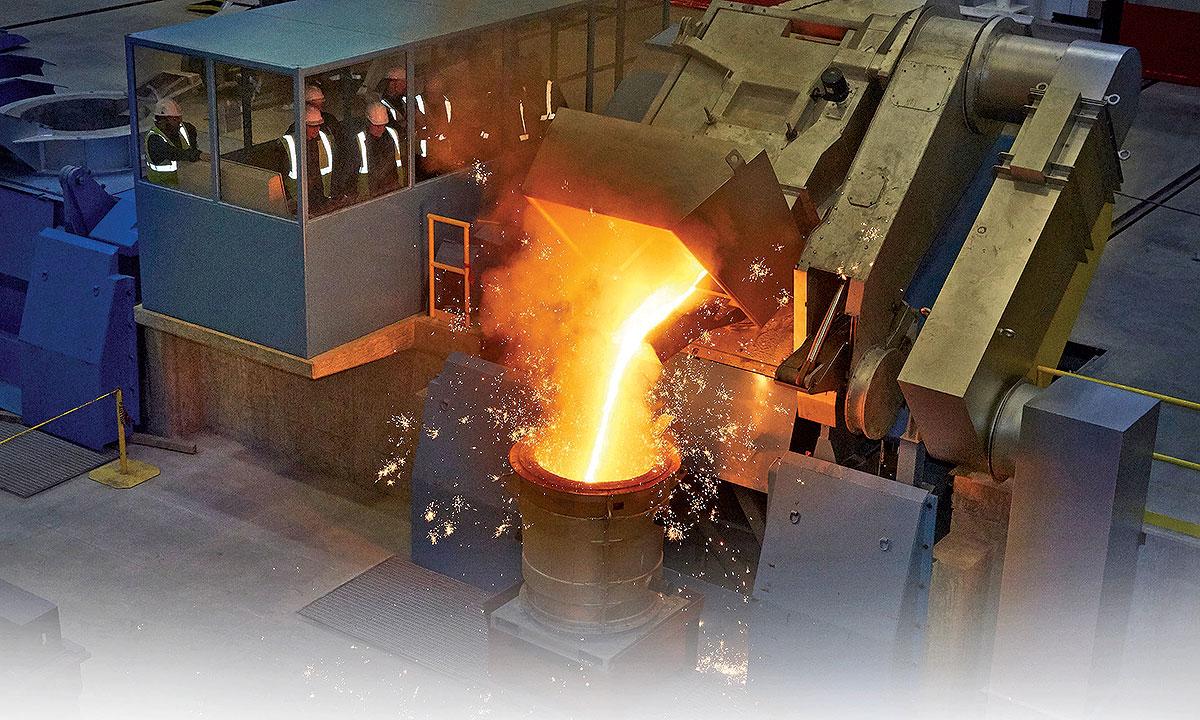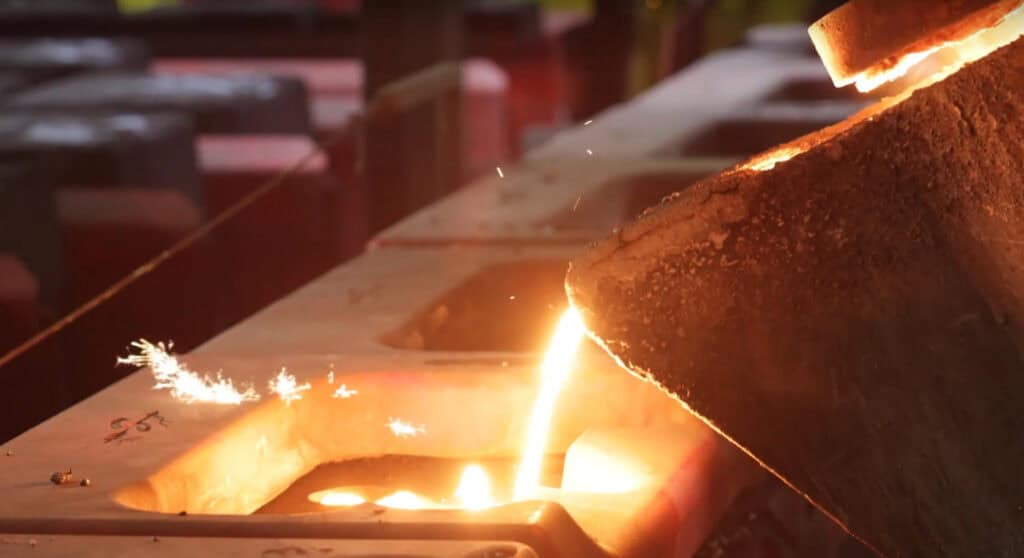Just How a Metal Foundry Adds To Sustainable Metal Manufacturing Practices
Metal foundries play a necessary role in promoting sustainability within the metal manufacturing market. By including recycled products, they minimize dependence on virgin sources and lessen environmental effects. Energy-efficient melting processes further minimize energy intake and emissions. However, the journey towards sustainable practices includes greater than just reusing and energy management. It incorporates a wider dedication to honest sourcing and ingenious innovations. The effects of these techniques are considerable and warrant closer examination.
The Role of Recycling in Metal Foundries
While metal production has generally depended on virgin materials, the raising focus on sustainability has actually led to a substantial shift in practices, especially in metal foundries. Recycling has actually become an important part of this improvement, permitting foundries to repurpose scrap metal and decrease dependence on mined resources. By incorporating recycled products right into their procedures, foundries not just lower environmental effect yet also reduced production prices.
The usage of recycled metals, such as light weight aluminum, copper, and steel, minimizes power intake and lowers greenhouse gas discharges linked with standard mining and refining approaches. Foundries can attain high-quality outcomes by utilizing innovative sorting and handling modern technologies to assure the pureness of recycled products. This emphasis on reusing fosters a round economic situation, where waste is reduced, and sources are used effectively. Metal foundries play a crucial duty in advertising lasting techniques within the metal manufacturing market.
Energy-Efficient Melting Techniques
Energy-efficient melting techniques are vital for boosting sustainability in metal manufacturing. These techniques significantly lower energy consumption throughout the melting process, which is just one of the most energy-intensive stages in metal production. Technologies such as induction melting, resistance home heating, and microwave melting offer enhanced effectiveness contrasted to standard approaches. Induction melting, for example, utilizes electro-magnetic areas to create warmth straight within the metal, decreasing power loss and giving precise temperature level control.
In addition, implementing warm healing systems can additionally enhance effectiveness by reusing and capturing waste heat produced during melting. Utilizing innovative insulation products and maximizing heating system layouts also contribute to power cost savings. By taking on these ingenious melting methods, metal foundries can decrease their carbon impact, decrease operational costs, and add to a more sustainable manufacturing landscape. The assimilation of energy-efficient techniques not just straightens with ecological goals but also satisfies the growing need for liable manufacturing methods in the metal industry.
Sustainable Sourcing of Raw Products
Sustainable sourcing of resources is necessary for reducing the environmental effect of metal production. This includes the raised utilization of recycled metals, the fostering of honest mining practices, and campaigns focused on regional sourcing. By focusing on these approaches, the sector can advertise responsible source administration and support local economies.

Recycled Metal Use
Just how can markets properly minimize their environmental effect while fulfilling the expanding demand for metal? One significant strategy is the application of recycled metal. By incorporating scrap metal right into their manufacturing procedures, foundries can decrease the removal of virgin materials, therefore lowering and conserving all-natural resources power consumption. Recycled steels require less energy to process contrasted to their raw equivalents, resulting in reduced greenhouse gas discharges. Additionally, using recycled metal assists draw away waste from land fills, promoting a round economy. Industries that prioritize recycled metal not just contribute to sustainability however additionally take advantage of cost savings related to lowered material purchase. Subsequently, recycled metal utilization stands as a crucial method for environmentally responsible metal manufacturing.
Moral Mining Practices
While the need for steels proceeds to climb, industries are progressively recognizing the value of honest mining techniques in making certain liable sourcing of raw products. Honest mining encompasses a dedication to ecological stewardship, social responsibility, and adherence to fair labor techniques. Firms are now focusing on partnerships with mines that demonstrate transparency in their operations, reducing environmental impact and respecting neighborhood areas. This technique not only promotes a lasting supply chain yet also enhances the online reputation of businesses included. By carrying out extensive criteria and qualifications, markets can deal with prohibited mining activities and promote the well-being of employees. Ultimately, honest mining methods contribute considerably to an extra sustainable metal production community, lining up financial development with social and environmental stability.
Local Sourcing Campaigns

Advancements in Metal Casting Procedures
Advancements in metal casting processes are transforming view publisher site the sector by integrating advanced recycling methods that decrease waste. Energy-efficient melting techniques are likewise being established to minimize power consumption throughout production. Furthermore, using innovative mold products adds to boosted efficiency and sustainability in casting operations.
Advanced Recycling Techniques
Advanced recycling techniques are changing metal casting procedures, greatly improving sustainability in the sector. These advancements focus on reprocessing and reclaiming scrap metal, considerably minimizing waste and the need for virgin materials. Strategies such as hydrometallurgy and pyrometallurgy allow foundries to extract useful steels from utilized elements, making certain reliable source use. Furthermore, progressed sorting and filtration innovations enhance the quality of recycled metals, making them suitable for high-performance applications. This not just reduces the ecological impact of metal production yet additionally fosters a circular economic situation by advertising the reuse of materials. As these recycling approaches continue to progress, they promise to better enhance operations within foundries and add to an extra sustainable metal manufacturing landscape.
Energy-Efficient Melting Approaches
While typical melting methods have actually long been the backbone of metal casting, recent developments have presented energy-efficient techniques that substantially lower power usage and exhausts. Technologies such as induction melting and electrical arc furnaces have gained importance, permitting for exact control over temperature level and reducing the demand for fossil fuels. These approaches not just improve energy efficiency but also advertise faster melting times, which translates to decrease operational prices. Furthermore, developments in warmth recuperation systems enable foundries to record and recycle excess heat generated during the melting process. This all natural technique to energy management not only supports sustainable techniques but additionally positions metal foundries as leaders in the change in the direction of greener manufacturing processes, additionally lining up with international sustainability objectives.
Ingenious Mold Products
As the need for more reliable and sustainable metal casting processes grows, the expedition of cutting-edge mold and mildew products has actually become a centerpiece in the industry. Typical mold and mildew products typically add to ecological obstacles, prompting the look for alternatives that decrease waste and energy usage. Recent improvements consist of the development of eco-friendly binders and recyclable composites, which not only enhance mold performance however additionally reduce ecological influence. Furthermore, the usage of 3D printing modern technology in mold production enables for intricate layouts that minimize product use and enable fast prototyping. These cutting-edge products not just improve casting accuracy but likewise line up with sustainability goals, showcasing the sector's commitment to reducing its carbon impact while maintaining high-quality production standards.
Reducing Waste Via Advanced Technology
Innovative innovations are changing the metal manufacturing sector by considerably decreasing waste and boosting performance. Advanced information analytics and maker learning algorithms enable foundries to optimize manufacturing procedures, minimizing and identifying ineffectiveness scrap product. Smart sensors monitor tools efficiency in real-time, permitting anticipating maintenance that decreases downtime and waste generation. Additionally, additive manufacturing methods, such as 3D printing, permit the production of complex parts with minimal product use, noticeably reducing waste contrasted to standard approaches.
Closed-loop systems are ending up being my company a lot more prevalent, wherein scrap metal and by-products are recycled back into the production cycle, guaranteeing that products are used to their maximum potential. This assimilation of modern technology not only advertises resource preservation however additionally boosts the overall sustainability of metal production methods. By welcoming these advancements, foundries can contribute to a much more sustainable future while preserving competition in the marketplace
The Influence of Foundries on Carbon Footprint Decrease
Foundries play a necessary function in lowering the carbon footprint of the metal manufacturing sector by executing numerous sustainable techniques. By utilizing energy-efficient modern technologies, such as electrical arc furnaces, these centers significantly reduced greenhouse gas emissions contrasted to conventional techniques. In addition, foundries progressively take on sustainable energy sources, which additionally reduces their dependence on nonrenewable fuel sources.
Recycling scrap metal is an additional crucial practice that foundries use, conserving sources and minimizing the demand for virgin products. This not just decreases waste however also lowers the energy-intensive removal processes connected with mining. The fostering of closed-loop water systems helps to decrease water use and decrease wastewater discharge, contributing to a more sustainable procedure.
Via these efforts, foundries demonstrate their commitment to ecological stewardship, causing a marked decrease in the overall carbon impact of the metal manufacturing field. Their recurring efforts are essential in the shift towards an extra lasting commercial landscape.
Regularly Asked Inquiries
What Kinds of Metals Are A Lot Of Generally Recycled in Foundries?
Aluminum, steel, brass, and copper are among one of the most commonly recycled metals in foundries. These metals are favored as a result of their high recycling rates, economic value, and extensive schedule, adding significantly to industrial sustainability efforts.
Exactly How Do Foundries Ensure the High Quality of Recycled Products?
Foundries determine the high quality of recycled materials through extensive testing, arranging, and purification processes. They apply advanced modern technologies to examine composition and get rid of impurities, assuring that the recycled metals satisfy market criteria for performance and safety and security.
What Qualifications Exist for Sustainable Foundry Practices?
Different qualifications exist for sustainable foundry techniques, consisting of ISO 14001 for environmental management, ISO 50001 for power administration, and LEED qualification for sustainable building methods (Aluminum Foundry). These accreditations assist ensure adherence to environmental and sustainability requirements in operations
How Do Foundries Measure Their Carbon Impact Reduction?
Foundries gauge carbon footprint decrease through devices like lifecycle evaluations, energy audits, and discharges tracking systems. They contrast baseline discharges to present outputs, evaluating enhancements in power performance, material usage, and sustainable power adoption gradually.
What Are the Economic Advantages of Sustainable Metal Production?
Lasting metal manufacturing offers financial advantages such as lowered operational prices, increased efficiency, improved market competitiveness, and potential government rewards. Additionally, it cultivates advancement and attracts ecologically aware customers, eventually driving long-term profitability for companies.
Metal foundries play a vital role in advertising why not check here sustainability within the metal production market. While metal production has generally relied on virgin products, the raising focus on sustainability has led to a significant change in practices, particularly in metal foundries. By integrating scrap metal right into their production procedures, foundries can reduce the extraction of virgin products, consequently conserving all-natural sources and minimizing power usage. Foundries play an essential function in minimizing the carbon footprint of the metal production sector by applying different sustainable techniques. Reusing scrap metal is another vital practice that foundries employ, preserving sources and reducing the demand for virgin products.